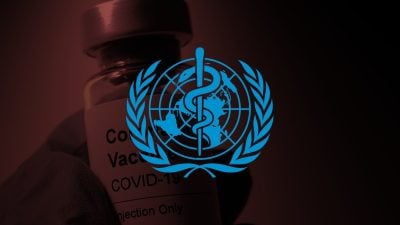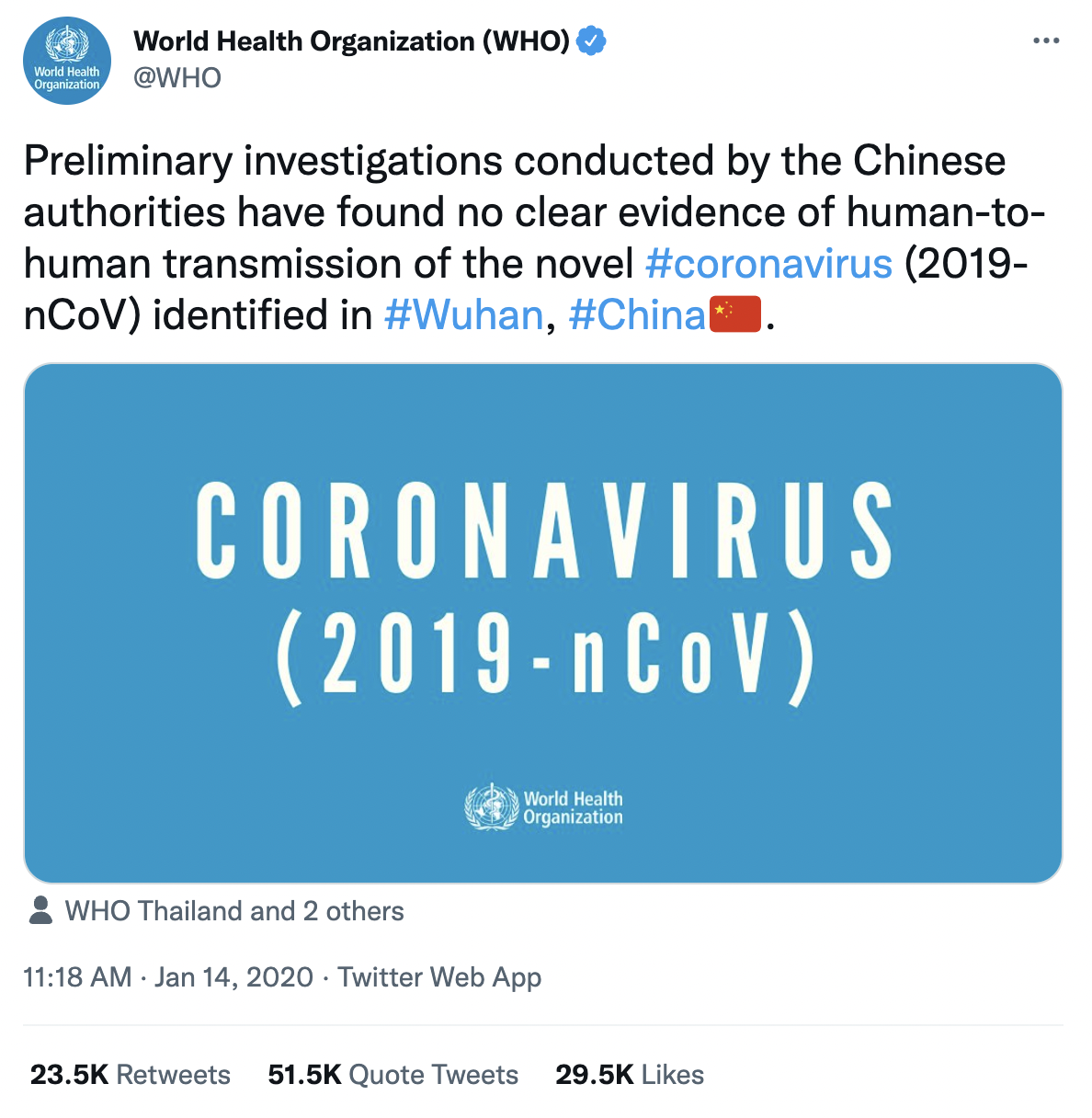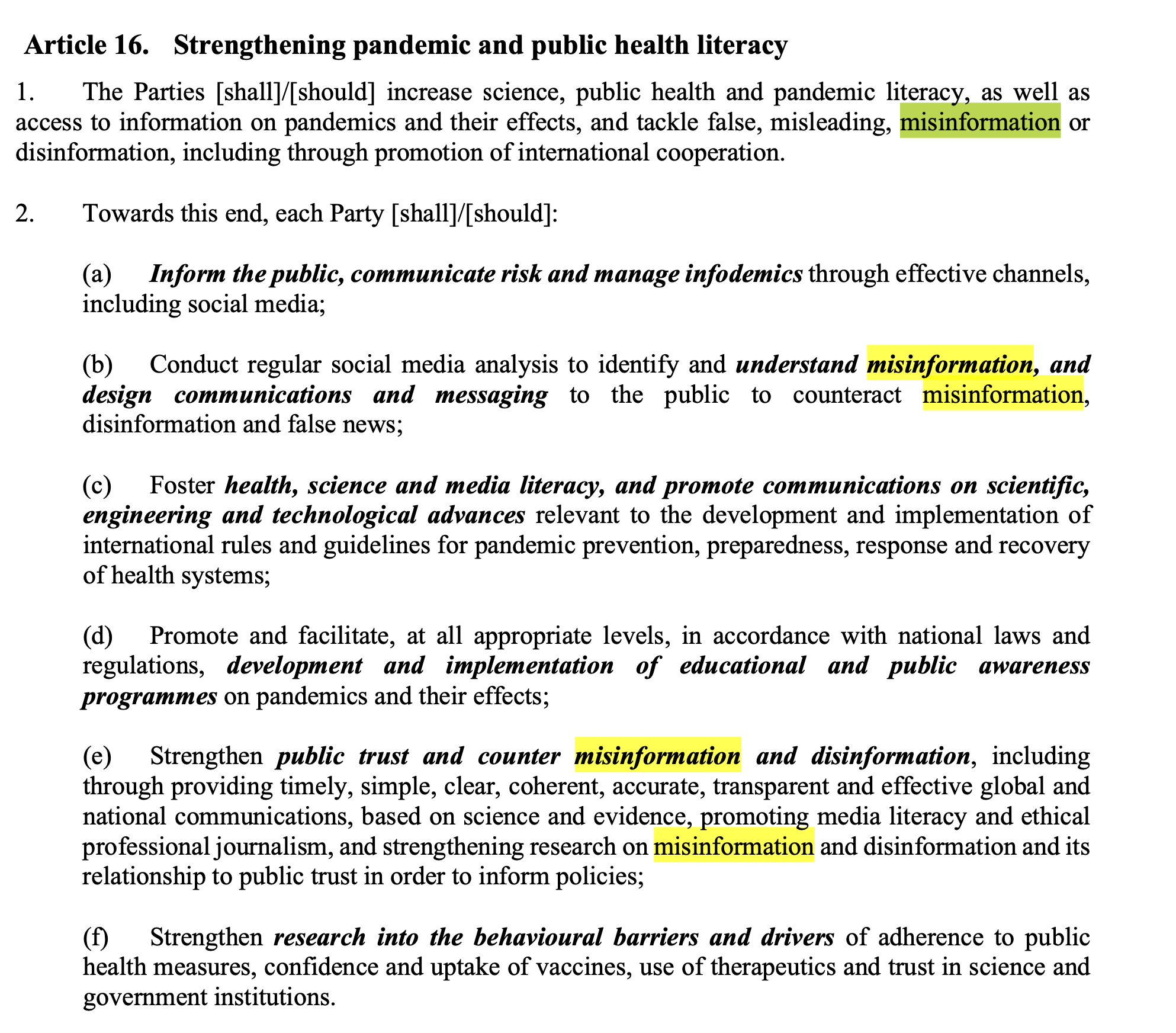International Pandemic Treaty: WHO Meets to Impose Censorship of “Misinformation”
The unelected health agency inches closer toward being granted unprecedented, legally-binding censorship powers.

All Global Research articles can be read in 51 languages by activating the Translate Website button below the author’s name.
To receive Global Research’s Daily Newsletter (selected articles), click here.
Follow us on Instagram and Twitter and subscribe to our Telegram Channel. Feel free to repost and share widely Global Research articles.
***
Members of the World Health Organization (WHO), an unelected international public health agency, are meeting to consider a draft version of a proposed international pandemic treaty which will give the WHO new powers to “tackle false, misleading, misinformation or disinformation” and be legally binding under international law.
The draft treaty contains various provisions in Article 16 (“Strengthening pandemic and public health literacy”) that require the WHO’s 194 member states (which represent 98% of all the countries in the world) to target so-called misinformation.
Member states are told to “conduct regular social media analysis to identify and understand misinformation,” design their own messaging to “counteract misinformation, disinformation and false news,” and manage “infodemics” (a phrase that was created by the WHO and describes “too much information including false or misleading information in digital and physical environments during a disease outbreak”).
While the provisions in Article 16 don’t directly call for member states to censor content that’s deemed to be misinformation, a provision in Article 14 (“Whole-of-government and other multisectoral actions”) paves the way for Big Tech to perform this censorship on the WHO’s behalf.
Under this provision, member states are required to collaborate with non-state actors and the private sector through an “all-encompassing whole-of-government, multistakeholder, multi-disciplinary and multi-level approach.”
Before this pandemic treaty existed, Big Tech willingly mass censored any content that it deemed to be “Covid misinformation,” even though there were no agreements or laws forcing them to do so. YouTube even introduced a far-reaching policy that made going against the WHO a violation of YouTube’s rules and deleted over 800,000 videos under this policy.
Under the pandemic treaty, the ties between governments and pro-censorship Big Tech companies will become even stronger and collaboration will be required.
We obtained a copy of the draft international pandemic treaty for you here.
Not only are these Big Tech-government ties being reinforced by the treaty but the WHO has also demonstrated its willingness to censor anything that it brands misinformation. Earlier this year, it called for Big Tech to work with it to censor monkeypox “misinformation.”
Additionally, the idea that the WHO should be acting as an arbiter of truth is especially ironic given that it was one of the most infamous producers of misleading information during the Covid pandemic. In a January 14, 2020 tweet, the organization stated that “preliminary investigations conducted by the Chinese authorities have found no clear evidence of human-to-human transmission” of the coronavirus.

The meeting to discuss the draft treaty began on December 5 and will run till December 7. It’s being attended by members of an intergovernmental negotiating body (INB) that was established by the World Health Assembly (WHA), the decision-making body of the WHO, in December 2021.
The INB was tasked with drafting and negotiating a “global accord on pandemic prevention, preparedness and response.” This global accord has become known as the international pandemic treaty.
Based on the current proposed timeline, the INB expects to finalize the international pandemic treaty by May 2024 and present a final report to the seventy-seventh WHA meeting.
We obtained a copy of the INB’s current proposed timeline for you here.
If passed, the international pandemic treaty will be adopted under Article 19 of the WHO Constitution. This article gives the WHA the power to impose legally binding conventions or agreements on WHO member states if two-thirds of the WHA vote in favor of them.
This process of lawmaking circumvents the usual process of elected officials voting on the laws that apply to their country by allowing a handful of global representatives to decide on the rules that apply to all countries. Even if representatives from a third of the WHO’s member states vote against the international pandemic treaty, it will still be applied to their country under international law.
Not only does this process limit the power of politicians to decide on the laws that apply to their specific country but it also limits the power of citizens to hold politicians accountable at the ballot box. Most of the representatives for member states are unelected diplomats who remain in their positions, even when new governments are elected. And most of the votes that determine whether an international law applies to a specific country are cast by representatives from other countries.
Despite this undemocratic process, the international pandemic treaty has the support of numerous democratic countries including the United States (US), United Kingdom (UK), Canada, Australia, New Zealand, and the European Council (EC) (which represents 27 European Union (EU) member states).
Some politicians from these countries have opposed the treaty and several petitions, including those that can force a parliamentary debate on the treaty, have gained traction.
However, the international pandemic treaty is still very much on track to being finalized by May 2024 and the WHO has shown no intention of abandoning its far-reaching power grab.
*
Note to readers: Please click the share buttons above. Follow us on Instagram and Twitter and subscribe to our Telegram Channel. Feel free to repost and share widely Global Research articles.
Featured image is from Reclaim the Net


